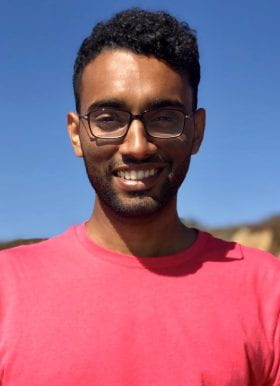
Pratyush Ramakrishna
Title: Personalized Treatments for Brain Disorders Through Innovative Software Tools
Pratyush Ramakrishna, Biomedical Engineering PhD student, 2023 Pivot 314 Fellow
Over the past decade, we’ve witnessed remarkable scientific breakthroughs in fields like computer vision and image processing. However, translating these innovations into practical applications in medical diagnostics is a meticulous and time-consuming process, requiring years of refinement and multiple iterations. This delay is primarily due to the stringent safety and accuracy standards inherent in technologies used for human patients, which are essential for gaining widespread acceptance and approval.
In the domain of Magnetic Resonance Imaging (MRI), for example, after data acquisition, several labor-intensive steps are necessary, during which radiology technicians must meticulously process the data to make the scans interpretable for medical professionals.
In response to these challenges, Turing Medical, co-founded at WashU, has embarked on a mission to create software tools that empower medical professionals to effectively harness the advancements in MRI research.
During my interactions with individuals affiliated with Turing Medical and throughout my interview process with them, I couldn’t help but notice the striking similarity between the research I was conducting for my PhD and the work being done at their company. I decided to join Turing for a summer internship as part of the Pivot 314 Fellowship, as I felt that I could meaningfully contribute to their products and simultaneously learn more about the inner workings of an early-stage startup. We agreed that for the duration of my internship, I would build a critical component of an upcoming product that Turing Medical was preparing to launch. Working on a future product allowed me to work at a slightly slower pace and provided me with the opportunity to learn while making mistakes as I familiarized myself with the software and the associated research.
As I progressed with my project, I began to discern several distinctions between research projects in the scientific space and those in the healthcare sector.
One notable difference was evident in software development practices. In the scientific domain, code often lacks peer review and reusability. In stark contrast, at Turing Medical, every line of code I wrote underwent rigorous internal scrutiny by two colleagues in the R&D team and would eventually undergo review by Turing Medical’s IT team, as well as external reviewers. This thorough review process meant that a significant portion of my internship was devoted to meticulously documenting and reviewing every line of code to ensure its reliability under all circumstances.
Another valuable takeaway from my internship experience was observing how Turing Medical consistently discussed its short, medium, and long-term strategies in team meetings and company-wide gatherings to optimize each employee’s workflow. Workflows and timelines were meticulously mapped out for every aspect of each project. Everyone I interacted with at Turing Medical was exceptionally approachable and transparent in their communication. I thoroughly enjoyed collaborating with my mentor and the R&D team, all of whom generously supported me in completing my project. The culture of open communication and realistic goal-setting at Turing Medical made it remarkably easy to seek assistance from my colleagues while successfully accomplishing the project I was assigned.
In summary, the internship provided me with a deeper appreciation for the work undertaken by healthcare startups and the significant effort required to bring a product to market. I am genuinely thankful for the opportunity to explore a career path closely aligned with my PhD research. Every interaction I’ve had with the St.Louis entrepreneurship community has been overwhelmingly positive, instilling in me a great deal of confidence and optimism regarding alternative career paths beyond academia.
